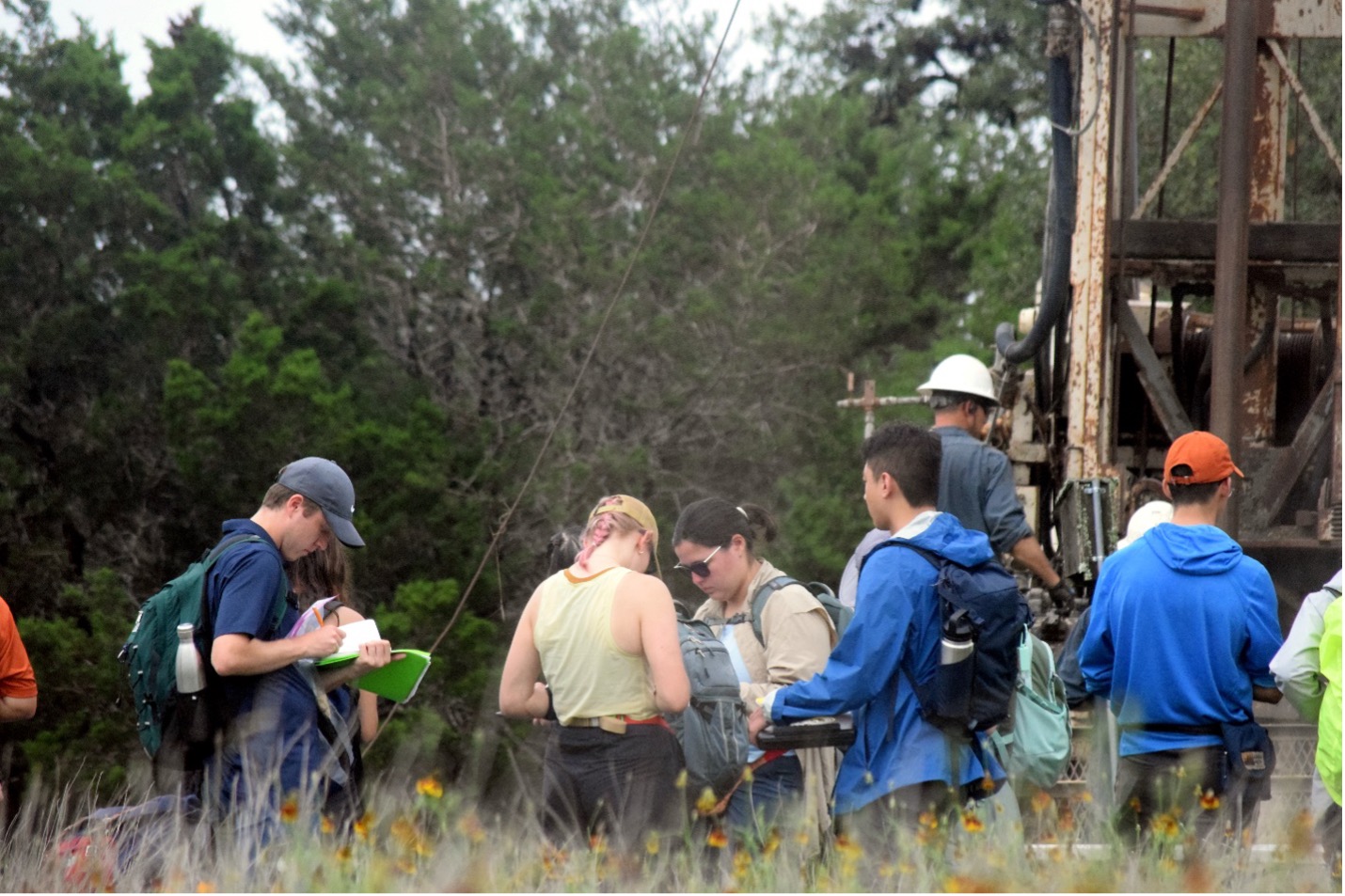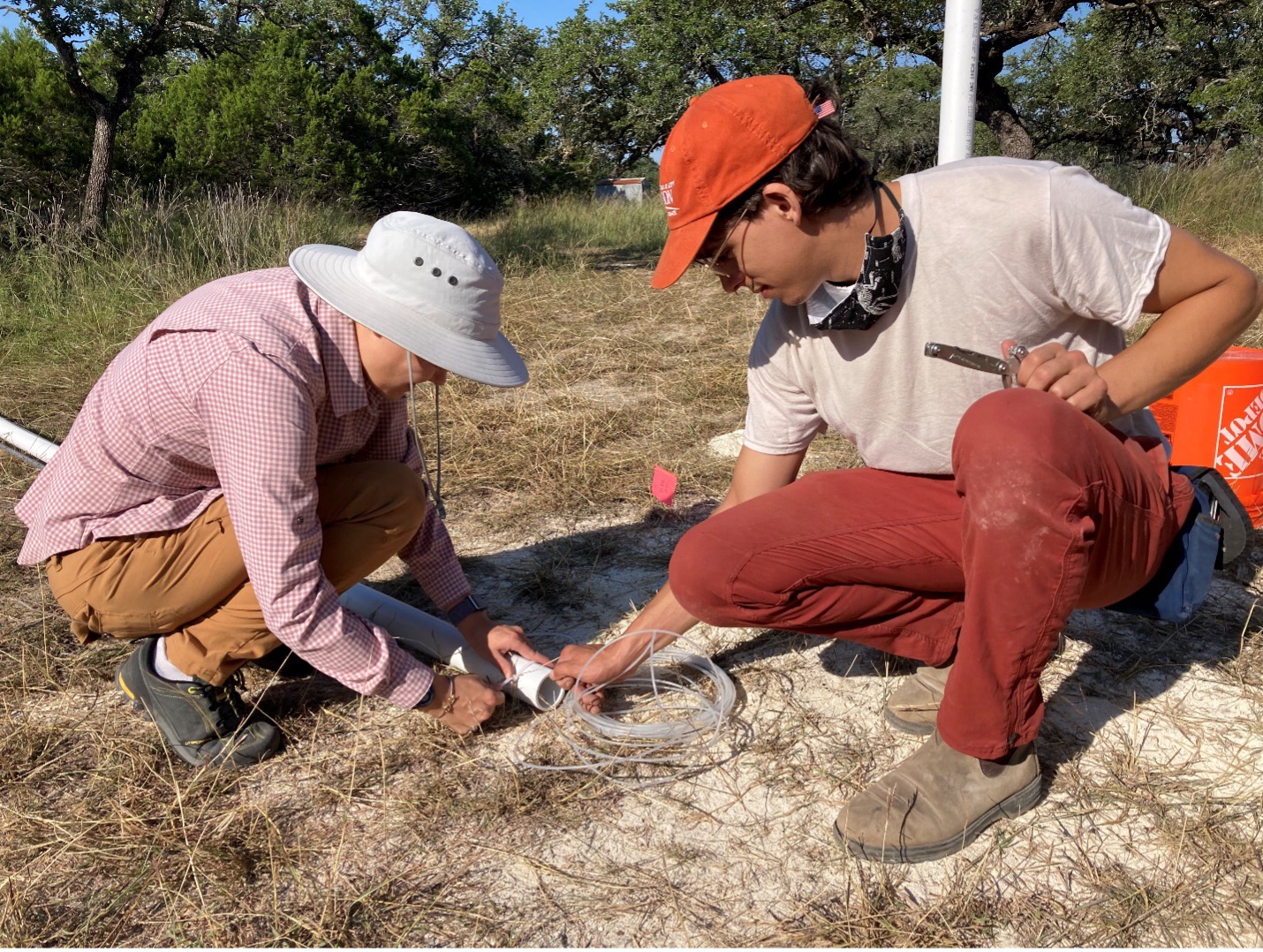
B.S. in Geosystems Engineering
The Geosystems Engineering major is split jointly between the Jackson School of Geosciences and Cockrell School of Engineering. This innovative engineering degree allows students to be both the data-gatherers of the natural environment and designers of innovative systems that can benefit us all by securing water and energy resources.
Why geosystems engineering?
Geosystems engineering students work in the challenging interface between the complexity of the natural environment and engineering principles of design. Through the unique combination of their domain knowledge in the geosciences and engineering expertise, students will be prepared for a wide range of career opportunities, and have the ability to apply what they’ve learned to make real societal impact. Students interested in tackling Earth’s problems not only from a scientific perspective, but also from a design perspective, will be well-suited for this degree.
What do geosystems engineers do?
Geosystems engineers design systems that address Earth in crisis: For example, developing new ways to access clean water and energy resources, creating more sustainable energy resources, remediating pollution, finding innovative ways to de-carbonize the atmosphere, and accessing critical minerals. By both understanding geological processes and the engineering methods needed to solve them, they can create new, applied solutions.

Career and graduate school opportunities
With this degree, students will be a powerhouse across the fields of both geoscience and engineering. They’ll be prepared with strong geoscience skills and the fundamentals of engineering, giving them an edge in the energy, environmental, and water resource management industries, along with many government agencies. Students who graduate with this degree will be on an accredited path to become a professional engineer.
Graduate school disciplines students will be ready for
- Environmental engineering
- Petroleum engineering
- Geology
- Geoscience
- Hydrology
Industries hiring geosystems engineers
- Civil engineering
- Energy
- Critical minerals
- Environmental consulting
- Government agencies
Wage data for related jobs
$97,490
Mining and Geological Engineers
$131,800
Petroleum Engineers
$87,480
Geoscientists
Median annual wage data courtesy of the Bureau of Labor Statistics
Research opportunities
Students of this major will have access to state-of-the-art labs and researchers at not only the Jackson School and Cockrell School, but also the UT Institute for Geophysics and Bureau of Economic Geology. Many geosystems engineering students choose to pursue internships during their time here as well.
All Jackson School undergraduates have an abundance of research opportunities at their fingertips. Explore more on our Undergraduate Research page.
Degree requirements
The required classes for geosystems engineering students are much more regimented than for other geoscience majors, and are largely pre-selected in the early years of the degree. This is so that students will learn the breadth and depth of necessary engineering and geological concepts. In addition to the classes listed here, students must also fulfil the university’s additional core curriculum needs. In their final years of study, students will have flexibility to pursue specific areas such as carbon sequestration, alternative energy, water resources, and petroleum engineering.
Petroleum and Geosystems Engineering courses
Take each of the following courses (35 credits).
- PGE 311: Numerical Methods and Programming
- PGE 322K: Transport Phenomena in Geosystems
- PGE 323K: Reservoir Engineering I: Primary Recovery
- PGE 326: Thermodynamics and Phase Behavior
- PGE 333T: Engineering Communication
- PGE 334: Reservoir Geomechanics
- PGE 358: Principles of Formation Evaluation
- PGE 365: Resource Economics and Valuation
- PGE 373L: Geosystems Engineering Design and Analysis
- PGE 424: Petrophysics
- PGE 430: Drilling and Well Completions
Geology foundation courses
Take each of the following courses (27 credits).
- GEO 303: Introduction to Geology
- GEO 376L: Field Methods in Groundwater Hydrology
- GEO 416E: Solid Earth Processes
- GEO 416S: Earth and Planetary Processes Through Time
- GEO 416W: Climate, Water and the Environment
- GEO 420K: Introduction to Field and Stratigraphic Methods
- GEO 476K: Groundwater Hydrology
Electives
Take six credits of approved engineering electives, and six credits of approve geosciences technical electives.
Building block requirements
Mathematics
Take at least these 12 credits (three classes).
- M 408K: Differential Calculus or M 408C: Differential and Integral Calculus
- M 408L: Integral Calculus
- M 408M: Multivariable Calculus
Physics
Take all 8 credits (these two classes and two labs).
- PHY 303K: Engineering Physics I
- PHY 105M: Laboratory For Physics 303K
- PHY 303L: Engineering Physics II
- PHY 105N: Laboratory For Physics 303L
Chemistry
Take at least six credits (these two classes; labs are not required).
- CH 301: Principles of Chemistry I
- CH 302: Principles of Chemistry II
Statistics and Data Sciences
Take three credits (this class).
- SDS 302F: Foundations of Data Analysis
Read more about these courses in the University of Texas course catalog. The 2024-2025 catalog will be available soon.
The 2024-2026 geosystems engineering degree plan is coming soon.
Past degree plans: 2022-2024 | 2020-2022 | 2018-2020 | 2014-2016
Next steps: Applying and transferring
Ready to start changing the world? If you’re a high school student interested in applying to the Jackson School to be a geosystems engineering major, please select Geological Sciences during the process of your undergraduate application to The University of Texas at Austin. Additional application information can be found on the UT Office of Admissions website and the Jackson School’s Admissions page.
Thinking of transferring to the Jackson School to be a geosystems engineering major? If you’re an undergraduate student already enrolled at The University of Texas at Austin, you may enter the Jackson School through an internal transfer process which occurs twice a year. Please visit the Jackson School’s Internal Transfers webpage for details about the internal transfer process, deadlines, and upcoming information session dates to learn more about our school and programs. We also encourage you to contact academic advising before you start this process.